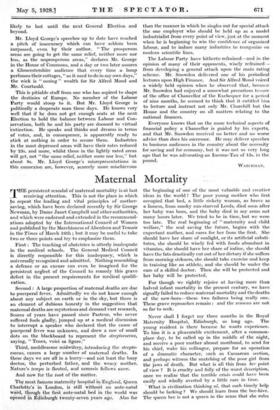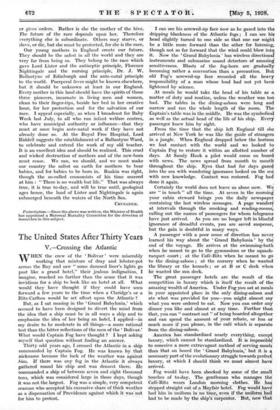Maternal Mortality
THE persistent scandal of maternal mortality is at last receiving attention. This is not the place in which to repeat the leading and vital principles of mother- saving, which have been declared recently by Sir George isiewman, by Dame Janet Campbell and other authorities, and which were endorsed and extended in the recommend- ations adopted by the International Council of Women and published by the Marchioness of Aberdeen and Temair in the Times of March 16th ; but it may be useful to take two or three points and try to emphasize them.
First : The teaching of obstetrics is utterly inadequate in the medical schools. The General Medical Council is directly responsible for this inadequacy, which is universally recognized and admitted. Nothing resembling a defence or an excuse can even be imagined for the persistent neglect of the Council to remedy this grave defect in the present requirements for medical qualifi- cation.
SeCond : A large proportion of maternal deaths are due to puerperal fever. Admittedly we do not know enough about any subject on earth or in the sky, but there is an element of dubious honesty in the suggestion that maternal deaths are mysterious and demand vast research. Scores of years have passed since Pasteur, who never suffered fools gladly, jumped up at a medical discussion to interrupt a speaker who declared that the cause of puerperal fever was unknown, and drew a row of small dots on the blackboard to represent the streptococcus, saying, " Tenez, voici sa figure."
Third, meddlesome midwifery, introducing the strepto- coccus, causes a large number of maternal deaths. In these days we are all in a hurry—and iiot least the busy doctor, the perturbed father, and the weary mother. Nature's tempo is flouted, and nemesis follows anon.
And now for the root of the matter.
The most fathous maternity hospital in.England, Queen Charlotte'ti in London, is still withoUt an ante-natal ward, though the first ante-natal, bed in the world was opened in Edinburgh twenty-seven years ago. Alas for the beginning of one of the most valuable and creative ideas in the world ! The poor young mother who first occupied that bed, a little rickety woman, as brave as a lioness, from smoky sun-starved Leeds, died soon after her baby was born, and the baby died in my arms not many hours later. We tried to be in time, but we were too late. The real beginning of " maternity and child welfare," the real saving the future, begins with the expectant mother, and cares for her from the first. She should have her share of sunlight, or its artificial substi- tutes, she should, be wisely fed with foods abundant in vitamins, she should have her share of iodine, she should have the fats drastically cut out of her dietary if she suffers from morning sickness, she should take exercise and keep in training like an athlete, and she should be under the care of a skilled doctor. Then she will be protected and her baby will be protected.
For though we rightly rejoice at having more than halved infant mortality in the present century, we have signally failed to reduce maternal mortality and the deaths of the new-born—these two failures being really one. These grave reproaches remain : and the reasons are not so far to seek.
Never shall I forget my three months in the Royal Maternity Hospital, Edinburgh, so long ago. The young resident is there because he wants experience. To him it is a pleasurable excitement, after a common- place day, to be called up in the middle of the night, and receive a poor mother almost moribund, to send for his chief, wake his colleague, prepare for an operation of a dramatic character; such as Caesarean section, and perhaps witness the snatching of the poor girl from the jaws of death. But what is all this from her point of view ? It is cruelty and folly of the worst description, once we realize that the terrible crisis could have been easily and wholly averted by a little care in time.
What is civilization thinking of, that such timely help should be lacking ? We should learn from the bee-hive. The queen bee is not a queen in the sense that she rules or gives' orders. Rather is she the mother of the hive. The future of the race depends upon her. -Therefore everything else is subordinate. Others may starve, or slave, or die, but she must be protected, for she is the race.
Our young mothers in England create our future. They should be the safest in all the world and they are very far from being so. They belong to the race which gave Lord Lister and the antiseptic principle, Florence Nightingale and the nursing principle, Dr. J. W. Ballantyne of Edinburgh and the ante-natal principle to the world. Puerperal fever might be known elsewhere, but it should be unknown at least in our England. Every mother in this land should have the spirits of those three pioneers, incarnate in living men and women, clean to their finger-tips, beside her bed in her creative hour, for her protection and for the salvation of our race. I appeal especially, as when I broadcast for Baby Week last July, to all who run infant welfare centres, who have municipal authority or influence—that they must at once begin ante-natal work if they have not already done so. At the Royal Free Hospital, Lord Riddell suggests the establishment of a Ballantyne Ward, to celebrate and extend the work of my old teacher. It is an excellent idea and should be realized. This cruel and wicked destruction of mothers and of the new-born must cease. We can, we should, and we must make our country the safest on earth for mothers to bear babies, and for babies to be born in. Ruskin was right, though the so-called economists of his time sneered at him : " There is no wealth but life." That was always true, it is true to-day, and will be true until, geological ages hence, the land- of Lister and Nightingale is again submerged beneath the waters of the North Sea.
CRUSADER.
Postscriptunt.—Since the above was written, the Minister of Health has appointed a Maternal Mortality Committee for the direction of researches in this subject.









































 Previous page
Previous page